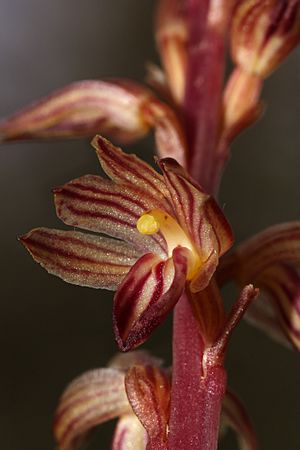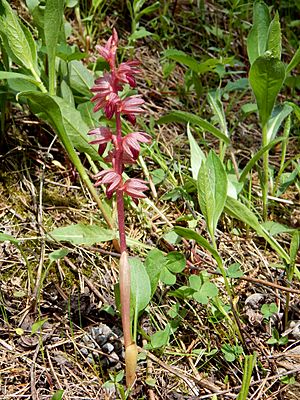Striped coralroot facts for kids
Quick facts for kids Striped coralroot |
|
|---|---|
 |
|
| Corallorhiza striata in the Columbia River Gorge | |
| Scientific classification |
|
| Kingdom: | Plantae |
| Clade: | Tracheophytes |
| Clade: | Angiosperms |
| Clade: | Monocots |
| Order: | Asparagales |
| Family: | Orchidaceae |
| Subfamily: | Epidendroideae |
| Genus: | Corallorhiza |
| Species: |
C. striata
|
| Binomial name | |
| Corallorhiza striata |
|
| Script error: The function "autoWithCaption" does not exist. | |
| Synonyms | |
|
Neottia striata (Lindl.) Kuntze |
|
Script error: No such module "Check for conflicting parameters".
The Corallorhiza striata is a special type of orchid plant. People often call it the striped coralroot or hooded coralroot. This beautiful flowering plant grows across a large area. You can find it in southern Canada, the northern and western United States, and Mexico.
This orchid lives in forests where the ground has lots of dry, decaying plant material. It prefers pine and mixed coniferous forests. Unlike most plants, the striped coralroot gets its food from tiny fungi that live underground. It does this through a special process called mycoheterotrophy. This means it doesn't make its own food using sunlight like green plants do.
What the Striped Coralroot Looks Like

Like other coralroot orchids, this plant gets its name from its underground stems. These stems, called rhizomes, look a bit like coral. The plant has a straight stem that stands about 15 to 50 centimeters (6 to 20 inches) tall. This stem can be red, pink, purple, or even yellowish-green to almost white.
The leaves of the striped coralroot are very small and don't have chlorophyll. This means they aren't green like normal leaves. Instead, they look like colorless scales that wrap around the stem. This plant also doesn't have regular roots. It depends completely on parasitism of fungi to get all its food and nutrients.
Flowers and Fruit
At the top of the stem, you'll find a cluster of 15 to 25 orchid flowers. This cluster is called a raceme. Each flower has sepals and petals that look similar. They can be pink or yellowish and often have darker pink or maroon stripes.
Inside each flower, there's a special part called a column. This column is made from the male and female parts of the flower joined together. It might have purple or red spots. After the flower is pollinated, it produces a fruit. This fruit is a capsule that is about one or two centimeters long.
See also
 In Spanish: Corallorhiza striata para niños
In Spanish: Corallorhiza striata para niños
 | William M. Jackson |
 | Juan E. Gilbert |
 | Neil deGrasse Tyson |

